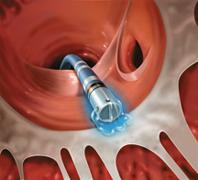
November 17, 2010 – Atrial fibrillation (AFib) patients treated with catheter ablation reported fewer symptoms and improved quality of life, according to data from Circulation Cardiovascular Quality and Outcomes. The patients, who were treated with Biosense Webster’s NaviStar ThermoCool catheter, were compared with patients treated with antiarrhythmia drugs.
During cardiac ablation, a catheter inserted into the heart delivers energy to those areas of the heart muscle causing the abnormal heart rhythm. The technique “disconnects” the pathway of the abnormal rhythm.
Data showed that, at one year, 66 percent of patients treated with catheter ablation remained AFib-free, compared to only 16 percent of patients treated with anti-arrhythmic drugs. Patients in the catheter ablation groups also experienced a significant improvement in quality of life. Those who were 10 to 20 percent below population norms saw their quality of life return to normal. Additionally, symptom frequency and severity scores decreased by more than 50 percent in the ablation group, but were unchanged in the drug group.
“An in-depth analysis of the trial's data revealed that, for the population studied, nine of 10 specific measures of quality of life and symptom burden – all except bodily pain – were superior in the group treated with catheter ablation, compared to the drug group,” said Matthew Reynolds, M.D., M.Sc., primary investigator for the sub-study and lead author, and medical director of the economics and quality of life assessment group at the Harvard Clinical Research Institute in Boston. “These differences persisted for the duration of the trial and were strongly associated with recurrent arrhythmias, which were much more frequent in the antiarrhythmic drug group. These results add to a growing body of literature demonstrating that catheter ablation improves quality of life more than antiarrhythmic drugs in appropriately selected patients."
AFib is the most prevalent heart rhythm disorder, yet most patients are treated with medication. In about half of them, the drugs do not control the symptoms.
“The results of this study provide important information for patients with AFib and their physicians because it demonstrates that effective treatment of AFib through an intervention like ablation can reduce the severity of their symptoms and improve the quality of their life,” Reynolds said.
The NaviStar ThermoCool is the only ablation catheter approved by the U.S. Food and Drug Administration for treating drug refractory recurrent symptomatic paroxysmal AFib
For more information: www.biosensewebster.com


 January 05, 2026
January 05, 2026 









